A government-commissioned research report has offered a glimpse at how schools responded to the impact of Covid in the last academic year.
The research into school recovery strategies, carried out by Ipsos MORI in partnership with Sheffield Hallam University and the Centre for Education and Youth, is based on a survey of 1,018 school leaders and more detailed interviews with 40 people.
Here’s what they found.
1. Schools cut back on music and PE
The research found that 56 per cent of primary and 37 per cent of secondary schools said they had reduced hours for certain subjects, “particularly music and PE”.
Primary schools also reported reducing hours for languages and singing, while secondaries mentioned design and technology.
However, some schools reported boosting teaching hours for PE and other outdoor activities.
One issue flagged was restricted access to things like science labs and music equipment, with one school reporting that equipment needed 72 hours of disinfecting before re-use.
Around half of primary leaders reported increasing the number of hours a week spent on English and maths, while most secondary schools kept the hours for those subjects the same as before Covid.
2. Trips called off and assemblies scaled back
The survey also revealed the extent to which extra-curricular activities were cut back because of the Covid pandemic.
Unsurprisingly, around nine in 10 schools reported that they didn’t run any trips or concerts, while two thirds said they did not welcome external speakers. Sixty-five per cent of primary schools and 51 per cent of secondaries did not run any non-catch-up-related clubs.
Assemblies were also affected, with 29 per cent of primary schools and 40 per cent of secondary schools not offering any at all.
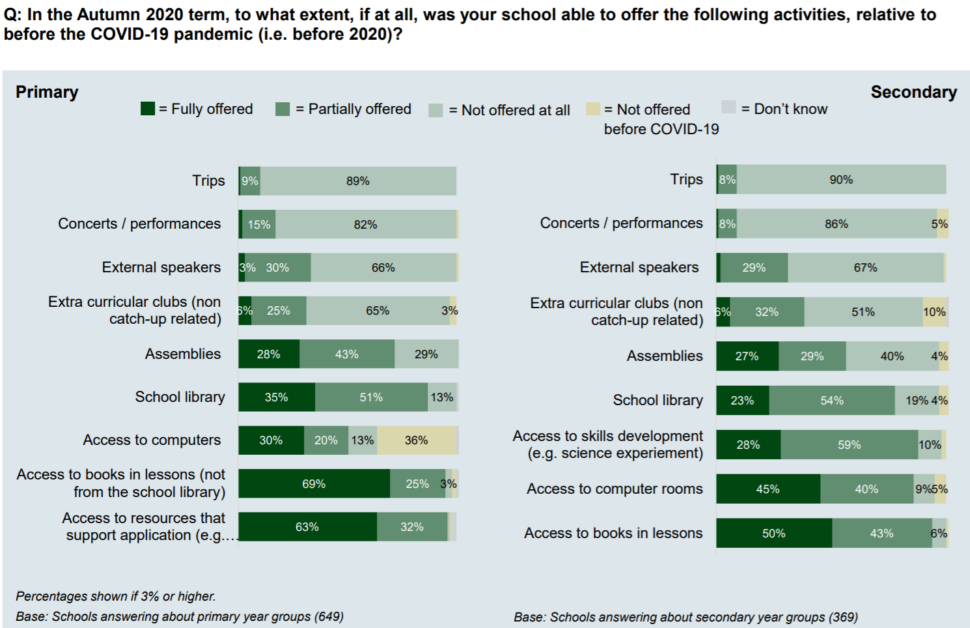
3. Schools ‘centralised’ curriculum and streamed children
As schools adapted to new ways of working in the spring and summer of 2021, some leaders interviewed reported adopting a more “centralised” approach to curriculum planning, as well as “streamlining” by dropping non-statutory aspects to free up time for catch-up and wellbeing activities.
Some schools even brought in streaming to support low-attaining pupils, with one reporting streaming in all of its year groups “which is not something I believe in, but I think that in this instance it was the right thing to do”.
Among the academic interventions deployed by schools, phonics was the most common cited by primary schools, while providing digital access to pupils was the top response among secondary leaders.
4. ‘Difficulties’ with summer school funding
Although three in five secondary leaders reported in the summer term that they were planning a summer school, several schools interviewed reported “difficulties” with the funding provided by the government.
The funding was retrospective and based on the numbers attending, so
“concerns were raised about recruitment and attendance”. One school even offered pupils a laptop as an incentive for attending.
There was also “a sense of reluctance” to run holiday clubs or interventions
from some school leaders because “both pupils and staff were exhausted and needed a
break”.
Schools also reported difficulties making “concrete recovery plans” at the time, as
longer-term funding and guidance was “viewed as uncertain”.
5. Mental health a big concern
In the autumn term, pupils’ emotional and mental health and wellbeing was the most common challenge cited by secondary leaders (46 per cent) and the second most common among primary leaders (42 per cent).
The most common challenge for primary schools was large differences in progress between pupils (46 per cent). .
As the academic year progressed, leaders in both phases reported that disparities in pupils’ social, emotional and academic progress increased, with pupils “having increasingly complex and variable needs”.
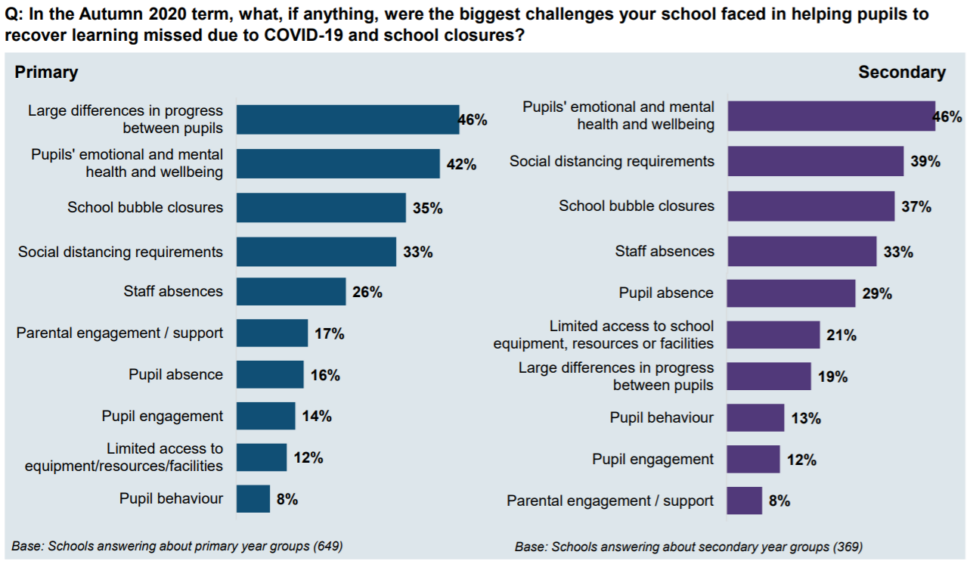
6. Pastoral interventions placed ‘substantial demands’ on staff
With mental health a big issue, schools enacted a number of pastoral interventions. These included ensuring a broad curriculum offer, providing information on accessing mental health support, as well as prioritising the teaching of PSHE or RSHE.
However, the research noted that pastoral interventions “often placed substantial demands on staff resources, as these were delivered in addition to their existing responsibilities”.
7. Primary leaders favoured EEF and council guidance
Leaders were asked what guidance they found very or somewhat useful in planning recovery strategies.
Ninety per cent of primary leaders cited guidance from the Education Endowment Foundation, while 87 per cent mentioned local authority guidance. This was more than the 86 per cent who cited government guidance.
Secondary leaders on the other hand were most likely to cite Gov.uk guidance (87 per cent), followed by LA guidance (83 per cent) and EEF guidance (80 per cent).
Asked what resources they found useful, leaders of both phases were most likely to cite educator-created online resources, while more than seven in 10 also mentioned the Oak National Academy.
8. Most leaders want more funding
Leaders were asked for their priorities for support needed to address long-term impacts of Covid.
Sixty-two per cent of primary leaders and 60 per cent of secondary leaders cited additional funding as a “higher priority”, while 62 per cent of secondary leaders wanted additional guidance on assessment.
In terms of wider system changes, primary leaders most favoured changes in accountability measures (77 per cent), while secondary leaders most commonly called for changes to exams for the 2021-22 academic year (73 per cent).
However, it’s worth pointing out that the surveys were carried out in the last academic year, before more recent announcements on funding, catch-up and exams.
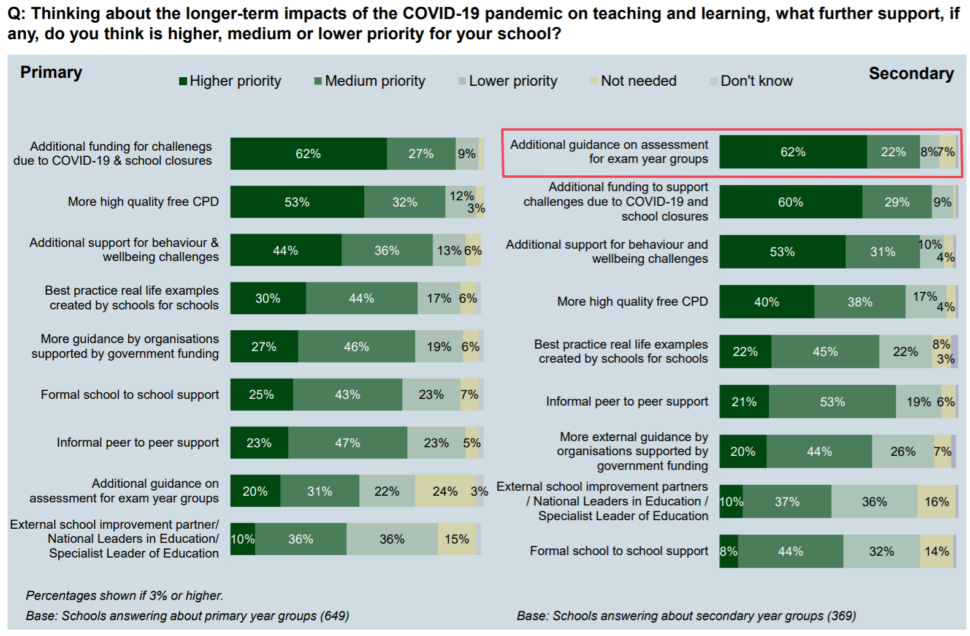






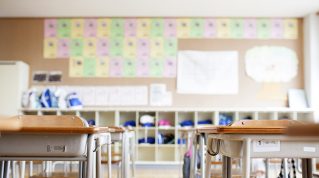
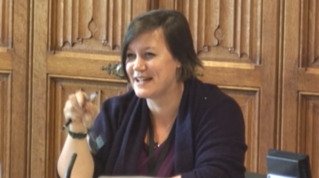

Too many leaders faced criticism and were unsupported by governors. Governors undertook very little training during the pandemic and therefore did not always have appropriate knowledge to support senior leaders.
Safeguarding was not given the priority it deserved and many pupils were at risk.